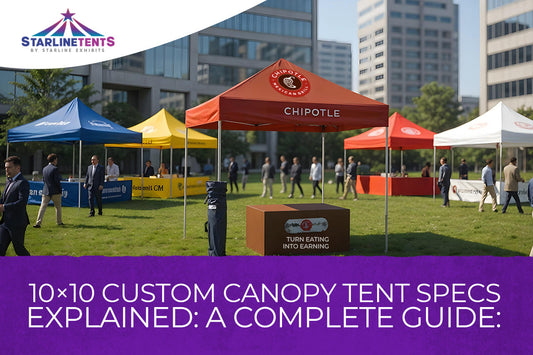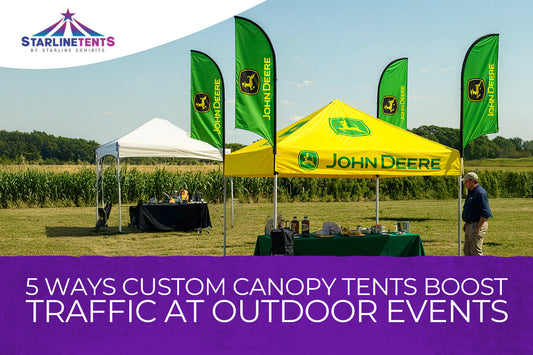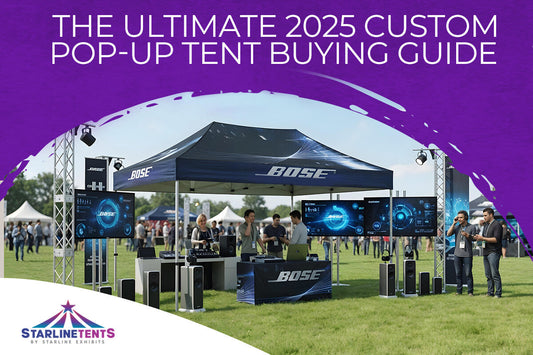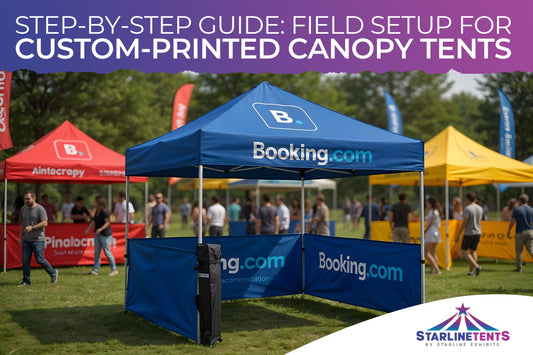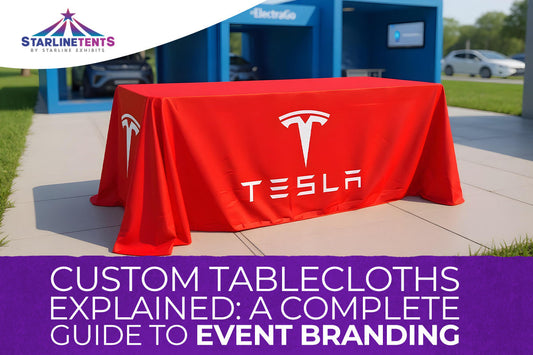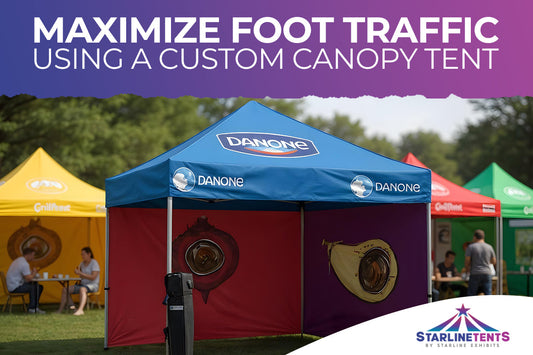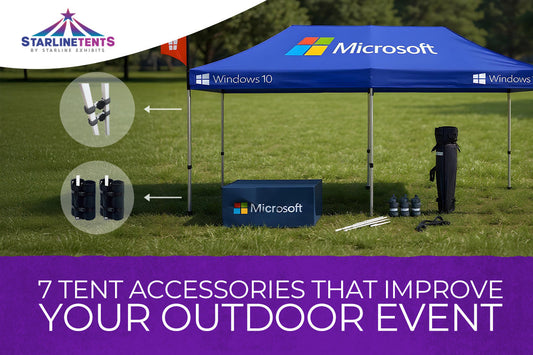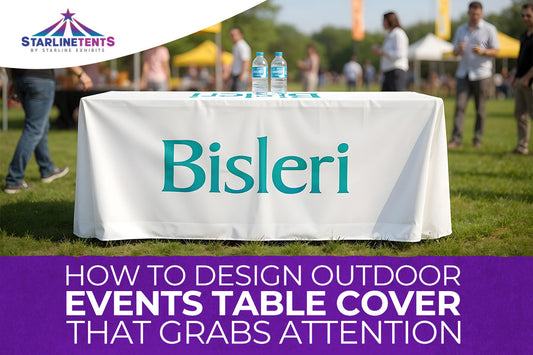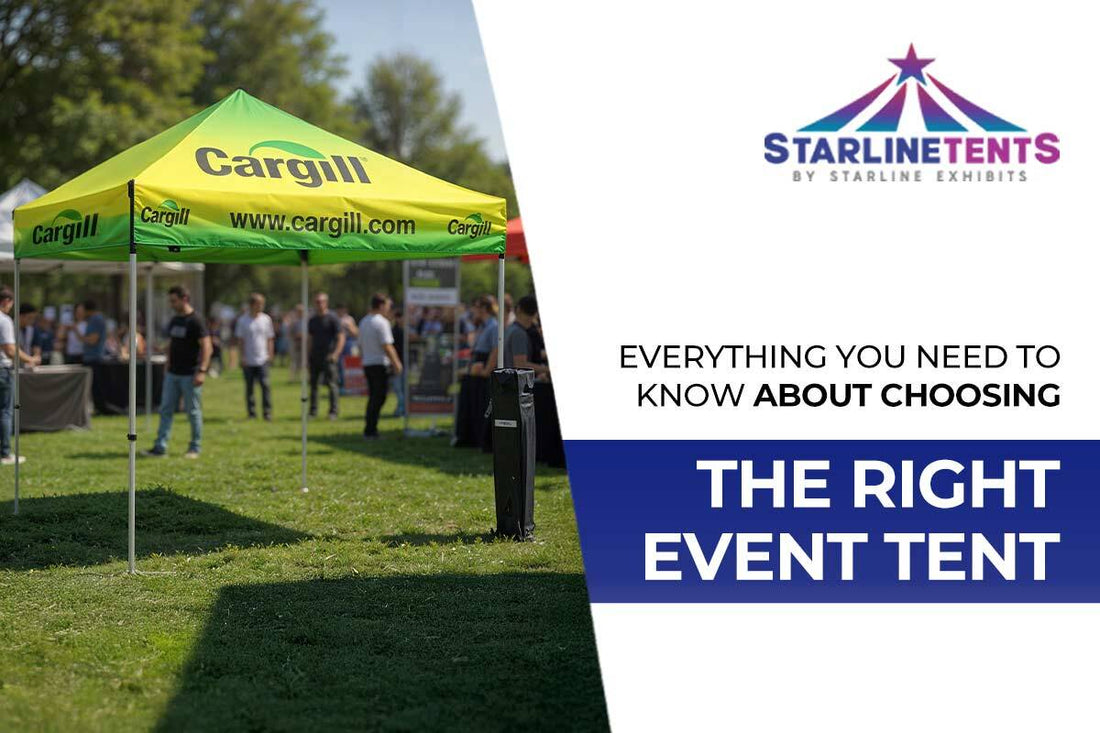
Everything You Need to Know About Choosing the Right Event Tent
Choosing the right event tent is more than just picking a size and color. The type of tent you choose affects your event’s comfort, safety, layout, and overall impression. Whether you're planning a trade show, festival, or private gathering, the right tent sets the tone.
This guide walks you through everything, from tent types and durability to customization and sizing. You’ll understand what to look for when evaluating custom event tents, and how to avoid common mistakes when choosing the ideal solution for your needs and environment.
Why Your Tent Choice Matters
Your tent is the main structure of your event. It’s where guests gather, products are displayed, and memories are made. A poor-quality tent can lead to last-minute stress, equipment damage, or even safety hazards—especially in unpredictable weather conditions.
The right commercial event tents not only provide shelter but also offer functionality, branding opportunity, and comfort. Whether you're promoting a brand or hosting a celebration, your tent must meet expectations on every level—performance, durability, and aesthetics.
Types of Event Tents to Consider
Not all tents are created equal. Your decision depends on how often you’ll use it, what kind of space you need, and the level of branding you want. Here's a breakdown of common tent types used for modern events:
Popular Tent Types:
-
Custom Pop Up Tents – Lightweight, fast setup, ideal for short events or single-person teams
-
Frame Tents – Stable with no centre poles; great for long-term use and open layouts
-
Large Event Tents – Built for crowd control and big outdoor events like fairs or music festivals
-
Heavy Duty Event Tents – Best for long-term, repeated outdoor use with harsh weather
Each of these options serves a different purpose. The better you match the tent to your event type, the smoother your setup and execution will be.
How to Choose the Right Tent for Your Event Type
Understanding your event type is the first step in narrowing down the right tent. From audience size to location restrictions, here’s a quick guide to help with your decision:
|
Event Type |
Ideal Tent Option |
|
Trade Shows |
Custom Pop Up Tents |
|
Corporate Events |
Frame or Custom Event Tents |
|
Outdoor events |
Strong Pole |
|
Festivals and Fairs |
Large Event Tents |
|
Food Vendors/Markets |
Canopy Tents for Events |
|
Long-Term Installations |
Heavy Duty Event Tents |
This basic pairing ensures you're selecting a tent that fits both your goals and your environment.
Key Features to Look for in an Event Tent
Once you know your event type, it’s time to look at specific features that enhance functionality and durability. Don’t just focus on size, construction quality, customization, and weather resistance matter equally.
Must-Have Features:
-
UV and waterproof canopy fabric for sun and rain protection
-
Rust-resistant frames (preferably aluminium or powder-coated steel)
-
Locking joints and reinforced corners for structural integrity
-
Tool-free assembly for faster, easier setup
-
Compatibility with add-ons like walls, banners, and lighting
Look for durable tents for outdoor use that hold up under pressure and can be reused without showing wear after a few events.
Understanding Frame and Fabric Materials
The combination of frame and canopy material can make or break your tent’s performance. Lightweight, affordable materials may seem appealing but often fall short under tough outdoor conditions.
-
Aluminium Frames – Lightweight, corrosion-resistant, perfect for frequent use
-
Steel Frames – Heavier but cost-effective; better for semi-permanent setups
-
Polyester Canopies - High durability, waterproof, UV-protected, perfect for branding
Choosing a high-quality canopy tent for events ensures better long-term ROI, especially if you'll be using it repeatedly or in different weather conditions.
Tent Size Guide for Events
Picking the right size isn’t just about guest count—it also depends on layout, furniture, signage, and walking space. Use this tent size guide for events to help plan your space:
|
Tent Size |
Standing Guests |
Seated Guests |
Recommended For |
|
10x10 ft |
10–15 |
6–8 |
Product displays, giveaways, kiosks |
|
10x20 ft |
20–30 |
12–16 |
Markets, medium booths, tasting tables |
|
20x20 ft |
40–50 |
30–35 |
corporate mixers, dining setups |
|
20x40 ft |
80–100 |
50–80 |
Banquets, performances, community events |
|
30x50 ft+ |
150+ |
100+ |
Outdoor festivals, concerts, large events |
Be sure to leave extra space for displays, check-ins, and food or service stations if needed.
Weather Considerations: Wind, Rain & Sun
Weather is one of the most unpredictable challenges for outdoor events. If you don’t prepare your tent accordingly, even a mild storm can disrupt everything. That’s why heavy duty event tents are recommended for long-duration or high-risk locations.
Prepare for Weather with:
-
Weighted anchor kits or ground stakes
-
Sidewalls and enclosures for wind and rain
-
UV-treated fabrics for sun-heavy climates
-
Reinforced stitching and tensioned frames for wind protection
-
Rain gutters between multiple tents
Always check the local forecast before your event and bring extra gear to manage surprises.
Setup, Portability, and Reuse
Ease of transport and setup can make a huge difference, especially if you manage your events with a small team. Custom pop up tents are best for ease of use, with collapsible frames and wheeled bags for travel.
For larger setups, consider modular tents with labelled poles, snap-lock frames, and multi-person setup instructions. Reusability is also a key factor—choose materials and designs built for long-term performance, not just single-use convenience.
Customization: Make It Yours
Your tent should reflect your identity. Whether you’re promoting a brand, a cause, or hosting a private affair, personalization helps your tent stand out and feel intentional. Customization options include:
Custom Add-Ons:
-
Logo-printed canopies and sidewalls
-
Matching table throws and backdrops
-
Retractable banners and flags
-
Internal lighting, flooring, and counters
-
Branded valances and awnings
Bringing these elements together turns a basic tent into a fully immersive and professional-looking environment.
Common Mistakes When Choosing an Event Tent
Many people overlook important details when choosing an event tent, which can result in expensive mistakes or ineffective setups. Avoid these common issues:
-
Choosing the wrong size for the venue or crowd
-
Ignoring weight and portability needs
-
Underestimating wind or rain exposure
-
Not verifying branding space or printing compatibility
-
Forgetting permit or fire-rating requirements for public spaces
Taking time to plan properly reduces stress and improves your event’s quality and flow.
Final Thoughts
Choosing the right tent is about more than just structure—it’s about experience, safety, branding, and performance. Whether you’re hosting a major corporate event or setting up a vendor booth, the right custom event tents create comfort and confidence from the ground up.
Ready to invest in a tent that fits your goals, space, and audience? Discover high-quality options, expert guidance, and full customization at Starline Tents.
FAQs
1. What’s the most versatile tent type for business use?
Custom pop up tents are the most versatile for short events, easy setup, and branding on the go.
2. Can large event tents be used in strong wind?
Yes, but only if they’re rated as heavy-duty and properly anchored with weights or stakes.
3. Are fire certifications required for commercial event tents?
In many public venues, yes. Always check local regulations and request flame-retardant certification from your supplier.
4. How many people fit in a 20x20 tent?
Roughly 40–50 people standing or 30–35 seated with space for tables or displays.
5. Can I connect multiple tents together?
Yes. Some modular systems allow for gutters and connectors between tents to create larger covered areas.

